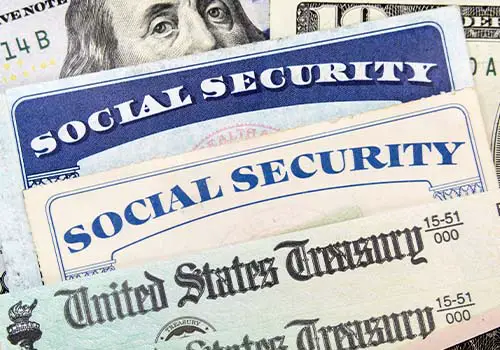Most people are familiar with the 6.2% Social Security tax that is withheld from each paycheck. During the Coronavirus pandemic, the Federal government considered many different ways to help Americans who were struggling financially.
One method utilized was a payroll tax deferral, which allowed employers to defer the withholding of the Social Security tax.
Naturally, this change brought many questions. Is repayment of the deferred Social Security tax necessary, and was deferral mandatory in the first place?
Keep reading as we give you all the Social Security tax deferral details, including how it works and how it might affect you.
What Is The Social Security Tax Deferral?
The tax deferral has two parts: the employee’s share of Social Security taxes and the employer’s share of those taxes. Both parts were affected by COVID relief provided in 2020.
First, we will focus on the employee share of the tax deferral. In August 2020, President Donald Trump issued a Presidential Memorandum, or Executive Order, to defer certain Social Security taxes for eligible employees.
The deferred amount was equal to the employee’s portion of the taxes or 6.2% of applicable wages. This meant that the 6.2% payroll tax would not need to be withheld from an employee’s wages on earnings during the deferral period from September 1, 2020, through December 31, 2020.
This only applies to individuals below a certain income level, and the tax withholding would still take place for those earning more than the limit. Note that the deferral also applied to Medicare taxes during this period, so all FICA taxes could be deferred.
Regarding the employer portion, separate COVID relief in 2020 allowed employers to defer payment of these taxes to the IRS as well. This would allow employers to reduce their tax liability and spread those payments over two years.
Reducing these tax obligations during the 2020 tax year substantially benefitted many struggling businesses and self-employed individuals.
The American Rescue Plan also extended the deferral of the employer portion of the Social Security tax through December 31, 2021.
- Remember, however, that these deferrals are not tax credits. The amount of tax owed to the Internal Revenue Service remains the same, but the due date has been pushed into the future.
However, the Cares Act did introduce separate tax credits that essentially cover the cost of some of these deferred taxes.
KEY TAKEAWAYS
- The Social Security tax deferral is one part of the COVID-19 relief program. It is designed to provide a little relief to employees and business owners.
- Employers can defer paying Social Security tax for several years, and employees can delay payment for about a year.
- If you choose to defer Social Security tax, you will need to repay the amount at a later date.
Do Employers Have To Defer Employees’ Social Security Tax?
Many people wondered whether businesses were required to defer the Social Security payroll tax withholding. The consensus is no.
The tax deferral was not mandatory, and many employers chose not to defer the employee portion of Social Security tax. There are a couple of reasons for this.
- First, little IRS guidance was associated with the Presidential Memorandum when it was first issued. This created a lot of confusion among employers about how the deferral was supposed to work and whether it was mandatory.
- Next, employers were not given much advance notice of this deferral. It takes time and effort to update HR and payroll systems for a change like this, and many employers could not implement the stoppage of these payroll taxes in such a short timeframe.
- Finally, the memo did not guarantee forgiveness for these income tax obligations when it was issued.
We now know that repayment of deferred taxes is required, which may have left many employers and employees in a financial bind.
Consider a couple of examples. Even though an employee’s paycheck may have been larger toward the end of 2020 due to this deferral, that same paycheck would take a hit in January 2021. Not only would the collection of the 6.2% tax begin again, but additional withholdings during each pay period in early 2021 would also be required to pay back the deferred taxes.
In addition, employers could get caught in the wrong spot when an employee quits or is fired before repaying those tax payments.
- In that situation, the employer would still be required to remit the total amount of the deferred payments to the IRS before the due date.
- It would be the employer’s responsibility to recover this amount from an employee who is no longer with the company.
Many employers would find this an undue burden, so they chose not to participate in deferring payroll taxes. It is possible, and even likely, that they would never recoup these deferred payroll taxes from those separated employees.
Must read articles related to Taxes & Social Security
- The ins and outs of OASDI tax.
- What is the future of Social Security?
- Is there a way to opt out of Social Security?
- How does the Social Security Trust Fund work?
- Figuring out payroll deductions and FICA tax.
When Are Deferred Taxes Due?
So, when are the payments due for those who participated in the tax deferral? The due dates are different for employees and employers.
Employee Deferral Repayment
We will first take a look at the employee’s due dates. First, remember that the taxes were deferred from September 1, 2020, through December 31, 2020. Those deferred taxes were collected from January 1, 2021, through April 30, 2021.
Employees were required to pay double their regular Social Security tax during this time. The deferred tax payment was originally due by May 1, 2021. Unless prior arrangements were made with the IRS, penalties and interest were scheduled to accrue on May 1, 2021. However, that due date was extended, and the deferred taxes became due on January 1, 2022.
Employer Deferral Repayment
Employers who decided not to pay their portion of the Social Security taxes during the deferral period will have longer to repay those amounts. The repayment for the employer portion was spread over a couple of years.
Half of the deferral was due on January 3, 2022, and the other half was due on January 3, 2023. An IRS notice reminded employers and self-employed individuals about the repayment schedule.
Employers and individuals can pay the employer Social Security tax due through the Electronic Federal Tax Payment System (EFTPS) or by credit card, debit card, check, or money order.
When paying these taxes, ensure they are paid separately from all other liabilities. This will ensure that they are correctly collected and posted to the correct item, as some individuals or businesses may also have payment due on other tax obligations.
TIP
Many employers opted not to participate in the Social Security deferral program because there was a lot of uncertainty about it, and employers might be responsible for employees’ taxes if they no longer work for the company.
Deferring Payments In Advance Of Credits
Remember that these deferrals were initially planned to be just that — deferrals. This means the tax would still be due; however, the due date would be later than originally scheduled.
As the COVID pandemic continued to take a toll on the economy and job market, additional action was taken by the Federal government.
The Families First Coronavirus Response Act (FFCRA) granted some credits for employers outside the tax deferral already in place.
Under the provisions of this Act, businesses could get up to a $10,000 tax credit per employee as an employee retention credit. This helped companies to retain employees during the height of the pandemic.
So, the deferrals and credits ended up working together. The outcome was essentially this.
Employers could initially defer their Social Security tax liability, even though they knew they would eventually get credit for some portion of that liability.
The credits would be applied at tax time. They would help to essentially wipe out any taxes due as a result of the deferral.
So, in short, the employer must pay a 6.2% Social Security tax on employee earnings. Under the provisions of the COVID relief efforts, employers could defer these payments to a later year and then get credits that would cover the cost of these deferrals.
The Bottom Line
The Federal government took many steps during 2020 to help ease the financial strain of the COVID pandemic. Many individuals and businesses were put in financial hardship due to the pandemic.
To help ease some of this strain, an Executive Order was issued that allowed the deferral of Social Security tax payments. Some provisions allowed for the deferral of both the employer and employee portion of the Social Security tax.
Participation in the deferral was not mandatory, but repayment of the back taxes was compulsory for both employees and employers.
The repayment schedule depends on whether you must repay the employee or employer portion of the tax.
Frequently Asked Questions
Yes, you will owe the IRS the deferral amount. These taxes were not forgiven. You were simply allowed to defer the amount to a later date.
For employees, you must repay all of the deferred amounts by January 1, 2022. Half of the deferred taxes were due on January 3, 2022 for employers. The other half was due on January 3, 2023.
Failure to repay these taxes will result in penalties and interest accruing. You could get into big trouble with the IRS if the amounts are not repaid.
You need to do nothing in most cases to pay back your taxes. Your employer should automatically withhold the proper amounts from your paycheck to pay back the taxes that you owe.
This should have already taken place, as payback of employee deferrals was due on January 1, 2022.
You should have noticed in 2021 that your Social Security withholdings doubled during the first few months of the year. Your employer was withholding the deferred amounts from your check to repay the IRS.
The order allowing the deferral did not limit the amount of the deferral. The order stated that the deferral applied to the 6.2% Social Security on the first $137,700 of wages.
That amount was equal to the Social Security tax limit at the time. However, not all employees were eligible to participate. Only those who earned less than $4,000 bi-weekly were eligible for the deferral.
This amount was calculated pro-rata for employees who were paid on different schedules. So, you must earn less than $2,000 weekly or $4,333 bi-monthly. You could not participate in the tax deferral if you earned more than these amounts.
It should also be noted that you may be eligible during one pay period but not the next. For instance, you could defer your taxes if you got paid weekly and your salary was $1,750. If your salary was $2,100 during the next pay period due to overtime, then you could not defer your taxes during that pay period.
The deferrals were all-or-nothing, as there were no pro-rata calculations to determine how close you were to the limit. If you made $1 over the limit, you could not defer any Social Security tax during that period.
At this time, you are not able to defer Social Security tax. These deferrals were only allowed from September 1, 2020, through December 31, 2020.
In most cases, it was not up to the employee to participate in the deferral program. Your employer decided whether they would.
If your employer participated, then there was nothing that you had to do. They would not deduct Social Security taxes from your gross pay. If you are self-employed, you may have decided to defer paying the “employer” portion of the Social Security tax.
Either way, repayment of the tax was mandatory. Since it was due on January 1, 2022, employees should have already made the payment.
For employers, half of the amount owing should have been paid by January 3, 2022, while the other half should have been paid by January 3, 2023.
You can find a Social Security Administration office near you by using our SSA office locator and searching for your closest location.





